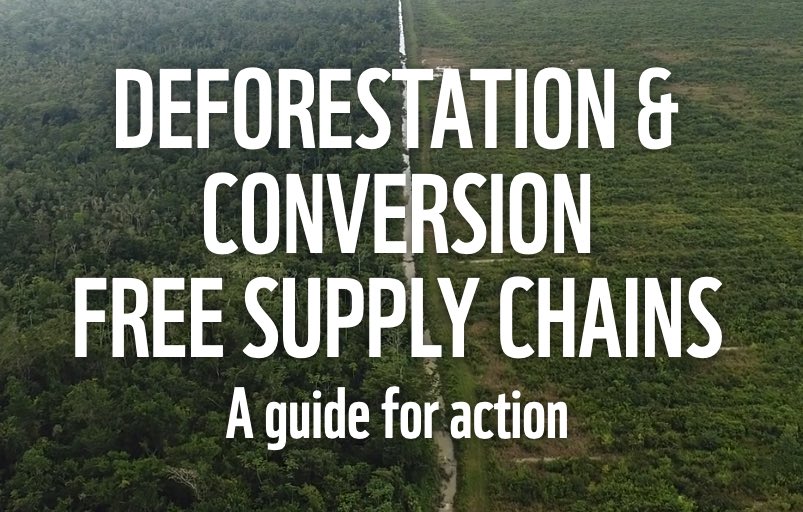
Business commitments plateau as deforestation and land conversion continue at an alarming rate. With cattle production as the highest Contributor.
New analysis released today shows that the actions businesses are taking are not enough to halt the destruction of the world’s most valuable ecosystems – forests, savannahs and grasslands among others – which continue to vanish at a rapid pace, unless urgent action is taken to close the implementation gap.
Deforestation and conversion-free supply chains:
A guide for action
The report, Deforestation and conversion-free supply chains: A guide for action published by WWF and Boston Consulting Group (BCG) comes a decade after members of the Consumer Goods Forum (CGF) first committed to eliminating deforestation from their supply chains, and examines the barriers to and requirements for progress as well as exploring the role that businesses can play in halting deforestation and land conversion.
While increasing public awareness has put pressure on businesses to act – and many have made voluntary commitments – the report finds that this progress is not making the desired impact: Only 41-46% of companies are reporting on their commitments, and the average progress in achieving these commitments is just 55%, highlighting the implementation gap.* Furthermore, processors and traders – the parts of the supply chain that have the power to affect the greatest change – have made the fewest commitments to date.
Between 2001 and 2015, agricultural commodities contributed to 39% of global tree-cover loss – including both deforestation and temporary losses, and every year on average 10 million hectares of forest loss are being destroyed, driven primarily by agriculture. This latest report spotlights four key commodities including soy, palm oil, beef and wood fibre plantations, which were the focus of CGF’s zero net deforestation pledge in 2010.
The connection between these commodities and the leading deforestation and conversion fronts is striking. The analysis shows that cattle production has displaced the most forest by far, accounting for 37% of agriculture-driven deforestation between 2001 and 2015. It is also the leading force – with soy – behind conversion of grasslands and savannahs, such as in Latin America’s Chaco and Cerrado regions. Interestingly then, it is the commodity which has seen the least number of businesses making deforestation and conversion free commitments. WWF is particularly keen to highlight this ahead of the Pre-Summit of the UN Food Systems Summit taking place at the end of July, which is calling for action on all levels of the food system to achieve Sustainable Development Goals (SDGs) by 2030.
“Large companies must work together – and in coordination with public and financial stakeholders – to persuade all the members of the commodity supply chain to make bolder collective commitments and implement concrete actions,”
says BCG Managing Director and Senior Partner Nicolas Kachaner.
“We need to develop viable economic models for smallholders and hold third parties accountable. And, perhaps most importantly, we need to enforce stricter mechanisms for tracing each commodity to its source and ensure we reach a critical scale for impact.”
While critical, voluntary commitments by businesses remain insufficient to drive the change required. The report calls for greater leadership, transparency, traceability and verification by businesses, buyers as well as producers, alongside strong government legislation to ensure deforestation and conversion-free supply chains in addition to commitments by financial institutions to drive systemic change.
“Critical natural ecosystems are vanishing, yet we cannot survive as a planet without them,” says Fran Raymond Price, Forest Practice Lead at WWF International.
“Companies have a critical role to play in halting and reversing the loss of nature, and it begins with making deforestation and conversion-free commitments a reality. Our new analysis shows that existing commitment schemes face hurdles of traceability and scale – and impacts are not following the pace that’s urgently needed. This must change quickly if businesses are indeed committed to contributing to a nature-positive world.”
Holistic approaches are reviewed in the report to halt deforestation and conversion. Businesses are advised to, firstly, shift from a “green supplies” mentality – purchasing only sustainable commodities – to one of “green suppliers”, setting targets beyond their own operational footprint and taking steps to halt deforestation and conversion across their entire supply chain. Secondly, they need to adopt a sector, landscape, or jurisdiction based approach which means addressing sectoral issues by collaborating with peers or taking on geography-based issues through coalitions of local stakeholders in order to achieve meaningful impact.
Such approaches will require a coordinated effort by businesses, one that rallies support from governments – national, regional and local; the finance sector, and non-governmental organizations (NGOs), if they are to respond decisively to the deforestation and conversion crisis.
Source: Boston Consulting Group, Gland Switzerland, July 13, 2023
Boston Consulting Group partners with leaders in business and society to tackle their most important challenges and capture their greatest opportunities.
Deforestation and conversion won’t stop unless business and governments adopt a systemic approach to sustainable sourcing.
Deforestation & conversion free supply chains
A guide for action:
https://deforestation-free.panda.org/
